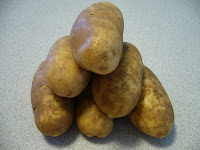Potatoes are an ingredient used in many dishes. But often, selecting the right potato for a recipe can be confusing, especially for new cooks. A recipe calls for potatoes, but does not specify which kind, so what do you use? Here are a few guidelines for uses, selecting, and pros and cons for the more
common types of potato.
Russet Potatoes
These are usually sold in 5 or 10 lb bags or individually by the pound. They are oblong, with thick, rough brown skins and usually have more dirt still sticking to them than other types of potatoes (but since you will be washing them, it does not really matter). I use these for baking potatoes and French fries. Many people use them for mashed potatoes, but I often find them to be rather pithy and stringy for that purpose. These are usually the cheapest potato available.
Red Potatoes
These have a thin, smooth red skin and are much plumper and more spherical than Russet Potatoes. They is a much creamier potato when mashed. I use these to mash and boil and in soups, stews, and potato salad. These are also sold in bags and individually by the pound. They are also often available as tiny “new potatoes” which are wonderful if you are in a hurry because their small size enables them to cook much faster.
White Potatoes
These are basically the same as Red Potatoes with a couple exceptions. They usually take 2-3 minutes longer to cook. They are not a pretty as Red Potatoes in a recipe where you want to keep the skin on. Depending on the week, either these or Red Potatoes are $1-$2.50 cheaper than the other in my stores, so I usually just buy and use whichever is cheaper unless I am making a specific recipe which requires one or the other.
Gold Potatoes
These are basically White Potatoes which are bright yellow/gold inside, but are also available with red skins. The taste is not very distinguishable from other potatoes. They are a fun change if you are looking for a bright color to spice up your meal. They used to be significantly more expensive than regular potatoes in my stores, but their popularity has evidently increased and they are more available and cheaper.
No matter what type of potato or recipe you are using, be sure to rinse your potatoes thoroughly before using them. Growers and retailers do not wash potatoes for a very good reason – most produce spoils much faster after it has been washed. If I am peeling a potato, I usually rinse it after peeling because this also rinses off any tiny scraps of peel which may be sticking to the potato. For washing potatoes with the peels still on, I use a vegetable brush. This makes it much easier to remove the dirt and the skin will protect the meat of the potato from the bristles.
Always cut the large eyes out of potatoes before eating them – they are not nice to eat.
Potatoes can turn green if they are exposed to light. Store them in a dark place – and a cool one if you have it because they keep longer. If potatoes are green they must be peeled until no hint of green remains – this is a sign of a toxic substance. Also remove any sprouts thoroughly.





